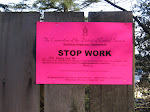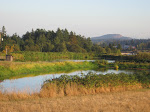This is part of a sermon a friend of mine gave to her church a couple of weeks ago:
What is our story today? What needs to be cured in our society today. Do those waters of Jordan that restored the skin of Naaman and brought about his spiritual renewal still baptize communities of faith?
What if Naaman needed to bathe in the river today? In biblical times the river represented freedom from bondage and renewal of spirit. In 1964 Israel began operating a dam that diverts water from the Sea of Galilee, a major Jordan River water provider, to the national water carrier, according to Hillel Glassmam, a stream expert at Israel's Parks Authority. Also in 1964 Jordan constructed a channel that diverted water from the Yarmouk River, another main tributary of the Jordan River. This resulted in great damage to the ecosystem. Syria has also built reservoirs that catch the Yarmouk's waters. In a year, the Yarmouk's flow into the Jordan River will dwindle to a trickle, once Syria and Jordan begin operating a dam they jointly built, he added. The three countries replenished the river with sewage water, agricultural runoff and salt water, Glassman said. The freshwater foliage that once flourished along the river's banks has been replaced with saline vegetation.
What if our local communities need personal and spiritual renewal from our rivers? Will we pay Naaman’s thirty thousand pieces of silver, 10 thousand pieces of gold and 10 changes of clothes? In British Columbia, many of our communities are now receiving their power from private energy corporations. The BC government has granted 'water licenses for power production' on hundreds of British Columbia Rivers & creeks to private energy corporations.
These licenses are for 40-year renewable terms with a very minimal royalty & rent payback to the government. They involve a massive transfer of water- energy and wealth to private corporations, some of who are positioning themselves to be merged or bought by giant U.S. energy corporations.
Prior to the election of the current government virtually all water licenses for power production and all transmission lines were owned by BC Hydro and Power Authority. That means you and me were the owners. This 'integration' allowed British Columbia to have one of the lowest rates for electricity in all North America. Additionally, BC Hydro would often earn tens or hundreds of millions from power exports and that money was turned over to the government for other public expenditures.
The licensing of water for power production to private energy companies represents an extremely significant shift in public policy. While this 'shift' may result in more 'green energy' production, there are enormous environmental, fiscal and political implications that have received little to no examination or debate, either amongst indigenous peoples or other affected communities.
Ask yourself these questions:
Despite an increased demand for electrical energy the current BC government has passed laws which prevent BC Hydro from constructing any more power projects, saying instead that BC Hydro must buy all its future power needs for BC consumers from private energy corporations.
In Alberta residential consumers buy their electrical power from private energy companies, such as EnMax Corporation, at aconsiderably higher prices then what is available from BC Hydro. That scenario is soon coming to British Columbia. Has the government asked you if you want to buy your electricity directly from private energy corporations at whatever price the 'continental electrical energy' market assigns to that energy?
Is it just that the enormous wealth that comes from selling the energy from our rivers & creeks be captured primarily by private corporations when there have been so many closures of schools, hospitals and community care facilities for seniors?
Is it just that the BC government allows private corporations to make such an incredible 'bundle of money' from our rivers and creeks while there is such a high degree of poverty and homelessness in British Columbia, when there is a huge need for more public low-cost housing? Why is it that the government has decided to seek minimal payment of rents, charges and royalties from these private energy corporations?
Is it just that legislation allows these energy corporations to sell-out to bigger United States energy corporations, which implies that our water and energy could come completely under foreign control? Is this good for BC's long-term energy security?
Is it just that the BC government has removed all legal barriers to the export of energy produced in B.C. which implies that there is nothing to stop these companies from directly exporting the power from our rivers/creeks to the United States so as to earn a higher revenue payable in U.S. dollars?
Has the government properly investigated the environmental impact of these private power projects on hundreds or rivers/creeks in British Columbia
Is the broader public interest better served by having our rivers/creeks and 'green' electrical energy production under public ownership and control, or is it better served by private energy corporations?
In low-water flow years how much of our water in those projects will be 'reserved' for power production and how much has been set aside/ 'reserved' for other needs such as wildlife, recreation, etc. ? Can the water licenses be amended or upgraded to give the corporations even more rights to water?
Why have not the the implications for British Columbia been investigated and reported in our mainstream newspaper and television media? Is it just that there is such a monopoly ownership of the mainstream media? Why the cover-up?
Why has not the current BC government made public the information and engaged in a "Conversation on Energy' with British Columbia before allowing this sell-out? Why the secrecy?
Why has the Water Comptroller decided NOT to hold public hearings prior to granting hundreds of water licenses for power production, as he is entitled to do under the Water Act? Where is the accountability? Are there terms and conditions attached to those water licenses, if so, what are they?
Is it just that many of BC's private energy corporations have made significant monetary contributions to the BC Liberal party, and that their 'organization' the "Independent Power Producers" enjoy an extremely close relationship with the Premier and some Cabinet ministers? In your mind do such dealings serve to increase your trust and confidence in the practice of democracy - or not?
When the Squamish Regional District voted twice to deny a private corporation the permission to build a hydroelectric facility on the Ashlu River, the provincial government passed Bill 30, overturning the right of local governments to legislate over local power production projects. Presently, Ledcor, a private energy corporation is building a private hydroelectric generation facility on the Ashlu River. Is this how a democracy should function?
Finally, ask yourself this fundamental question, who pays and who benefits from this enormous shift in 'ownership and control' of public water and energy resources? Do you think that this 'shift' will create a more just, a more equal society or does it set the conditions for a few to benefit privately. Does this 'shift' create the kind of legacy you wish to leave your children and grandchildren?
Where is God in this picture? When is the welfare of the community to be considered?
In these times, however, we have different ways of dealing with politicians who worship false idols. We vote them out. Let us share that God within us and build a community that shares its resources. The next time I fish, swim or seek spiritual renewal in a BC river, I want to give thanks to God and my community, not to a P3.
Saturday, February 2, 2008
Water Sermon
Subscribe to:
Post Comments (Atom)




















No comments:
Post a Comment